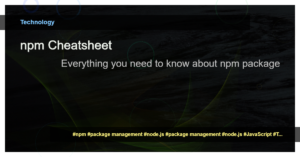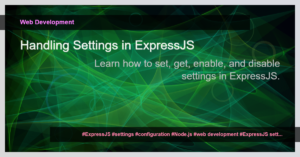So, you have an upcoming Node.js interview and you want to make sure you’re well-prepared. Look no further! In this article, we’ll provide you with a comprehensive checklist of topics and concepts that you should cover during your Node.js interview preparation.
Setting up Node.js Environment
Before diving into the specific topics, it’s important to have the right setup for developing Node.js applications. Make sure to:
- Install Node.js: Download and install the latest stable version of Node.js from the official website.
- Verify installation: Open the command prompt and run the command
node -vto ensure that Node.js is successfully installed. - Install npm: npm (Node Package Manager) comes bundled with Node.js. Run the command
npm -vto confirm its installation. - Choose a code editor: Use a suitable code editor like VS Code or Atom for writing Node.js code. Familiarize yourself with its features and keyboard shortcuts.
Essential Node.js Concepts
During a Node.js interview, you’ll be asked about the core concepts and features of Node.js. Make sure you have a good understanding of the following topics:
1. Event-driven Architecture
- Explain the event-driven architecture of Node.js.
- Discuss the main components involved in event handling in Node.js.
- Provide examples of how to use events and event emitters in Node.js code.
2. Modules and npm
- Define modules and explain their importance in Node.js.
- Discuss the difference between core modules and external modules.
- Describe the purpose of npm and how to use it to install, manage, and publish Node.js packages.
3. Asynchronous Programming
- Understand the concept of asynchronous programming in Node.js.
- Explain the role of callbacks, promises, and async/await in managing asynchronous operations.
- Provide examples of handling asynchronous tasks in Node.js using callbacks and promises.
4. Express.js Framework
- Explain the role of Express.js in Node.js web development.
- Discuss the features and benefits of using Express.js for building web applications.
- Demonstrate how to set up a basic Express.js application with routing and middleware.



